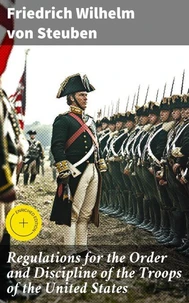Regulations for the Order and Discipline of the Troops of the United States
Par :Formats :
Disponible dans votre compte client Decitre ou Furet du Nord dès validation de votre commande. Le format ePub est :
- Compatible avec une lecture sur My Vivlio (smartphone, tablette, ordinateur)
- Compatible avec une lecture sur liseuses Vivlio
- Pour les liseuses autres que Vivlio, vous devez utiliser le logiciel Adobe Digital Edition. Non compatible avec la lecture sur les liseuses Kindle, Remarkable et Sony
 , qui est-ce ?
, qui est-ce ?Notre partenaire de plateforme de lecture numérique où vous retrouverez l'ensemble de vos ebooks gratuitement
Pour en savoir plus sur nos ebooks, consultez notre aide en ligne ici
- Nombre de pages62
- FormatePub
- ISBN859-65--4701951-0
- EAN8596547019510
- Date de parution29/05/2022
- Protection num.Digital Watermarking
- Taille522 Ko
- Infos supplémentairesepub
- ÉditeurDIGICAT
Résumé
Friedrich Wilhelm von Steuben's "Regulations for the Order and Discipline of the Troops of the United States" serves as a pivotal military manual that transformed the Continental Army during the American Revolutionary War. Written in a pragmatic and didactic style, the book provides detailed insights into military tactics, organization, and the essential conduct of troops, emphasizing the importance of discipline and drilled precision.
Steuben's work reflects the Enlightenment ideals of order and rationality, which were imperative for establishing a cohesive and effective military force amid the chaotic struggle for independence. Steuben, a Prussian officer and military engineer, played a crucial role as a volunteer inspector general for the Continental Army. His experiences in the highly organized Prussian military propelled him to reform the training and operations of American forces.
Arriving in the United States in 1777, he quickly recognized the disarray within the ranks and set out to address these challenges, thus shaping the future of military practice in America through this comprehensive guide. This manual is invaluable not only for historians seeking to understand the military foundations of the United States but also for modern military leaders, historians, and enthusiasts interested in the evolution of military discipline.
Steuben's methodical approach not only instilled a sense of professionalism but also underscored the significance of training and leadership, making this text a cornerstone of military literature.
Steuben's work reflects the Enlightenment ideals of order and rationality, which were imperative for establishing a cohesive and effective military force amid the chaotic struggle for independence. Steuben, a Prussian officer and military engineer, played a crucial role as a volunteer inspector general for the Continental Army. His experiences in the highly organized Prussian military propelled him to reform the training and operations of American forces.
Arriving in the United States in 1777, he quickly recognized the disarray within the ranks and set out to address these challenges, thus shaping the future of military practice in America through this comprehensive guide. This manual is invaluable not only for historians seeking to understand the military foundations of the United States but also for modern military leaders, historians, and enthusiasts interested in the evolution of military discipline.
Steuben's methodical approach not only instilled a sense of professionalism but also underscored the significance of training and leadership, making this text a cornerstone of military literature.
Friedrich Wilhelm von Steuben's "Regulations for the Order and Discipline of the Troops of the United States" serves as a pivotal military manual that transformed the Continental Army during the American Revolutionary War. Written in a pragmatic and didactic style, the book provides detailed insights into military tactics, organization, and the essential conduct of troops, emphasizing the importance of discipline and drilled precision.
Steuben's work reflects the Enlightenment ideals of order and rationality, which were imperative for establishing a cohesive and effective military force amid the chaotic struggle for independence. Steuben, a Prussian officer and military engineer, played a crucial role as a volunteer inspector general for the Continental Army. His experiences in the highly organized Prussian military propelled him to reform the training and operations of American forces.
Arriving in the United States in 1777, he quickly recognized the disarray within the ranks and set out to address these challenges, thus shaping the future of military practice in America through this comprehensive guide. This manual is invaluable not only for historians seeking to understand the military foundations of the United States but also for modern military leaders, historians, and enthusiasts interested in the evolution of military discipline.
Steuben's methodical approach not only instilled a sense of professionalism but also underscored the significance of training and leadership, making this text a cornerstone of military literature.
Steuben's work reflects the Enlightenment ideals of order and rationality, which were imperative for establishing a cohesive and effective military force amid the chaotic struggle for independence. Steuben, a Prussian officer and military engineer, played a crucial role as a volunteer inspector general for the Continental Army. His experiences in the highly organized Prussian military propelled him to reform the training and operations of American forces.
Arriving in the United States in 1777, he quickly recognized the disarray within the ranks and set out to address these challenges, thus shaping the future of military practice in America through this comprehensive guide. This manual is invaluable not only for historians seeking to understand the military foundations of the United States but also for modern military leaders, historians, and enthusiasts interested in the evolution of military discipline.
Steuben's methodical approach not only instilled a sense of professionalism but also underscored the significance of training and leadership, making this text a cornerstone of military literature.


